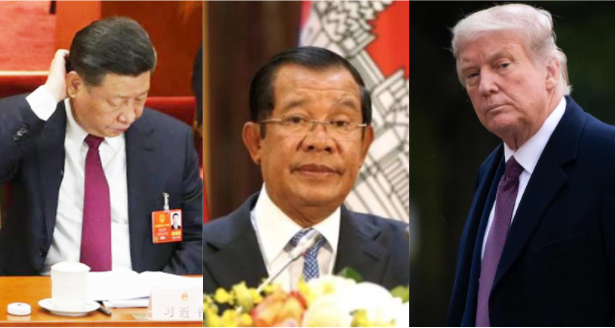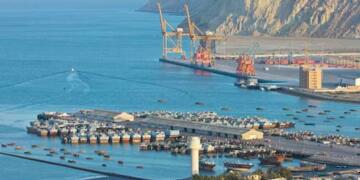The US-China rivalry is fast taking shape of a cold war wherein both giants try to pull more and more regional actors into their axis leading to a massive powerplay in the Western Pacific with no end in sight. Take the example of Cambodia, a Southeast Asian nation which was about to fall into China’s lap only a week ago is now turning towards the US all over again.
Last week, the Cambodian government demolished a facility built by the United States on the country’s largest Naval base, Ream Naval Base. The facility was one of the several US-funded facilities at the Cambodian Naval Base. The move had stoked fears of Cambodia signing a secret deal with China to relocate these facilities and provide Beijing access to the Ream Naval Base. However, now Cambodia has sought to make it clear that the naval base is open for all and not just China.
Cambodia is trying to calm down tempers here and avoiding a sharp tilt towards China. Cambodia’s latest assurance comes even as the US had started showing its annoyance with the demolition of the US-built facility.
The US annoyance was natural because even though Cambodia’s 443 km coastline is shorter than its neighbours, but it’s strategically crucial as it sits in between trade routes considered significant by China. Also, the Ream Naval Base is itself located in the Gulf of Thailand, providing ready access into the hotly-contested South China Sea. Amidst the ongoing US-China rivalry in the disputed South China Sea, the Ream Naval Base becomes extremely crucial for the Pentagon.
Chad Roedemeier, Information Officer at the U.S. Embassy in Cambodia in Phnom Penh had said, “We are disappointed that Cambodian military authorities have chosen to demolish a maritime security facility that is only seven years old and was a sign of U.S.-Cambodia relations.”
Amid concerns that the US-built facility was demolished by Cambodia to host Chinese soldiers and military assets, Roedemeier had added, “Such a military presence would negatively impact the U.S.-Cambodia bilateral relationship and be disruptive and destabilizing to the Indo-Pacific region.”
The US strategy of making its disappointment known about the razing of a US-built facility at the Ream Naval Base has actually done the trick. Cambodia is now trying to soothe Washington, instead of unwittingly falling into the paper Dragon’s lap. Cambodia has been enthusiastically denying any secret deal with Beijing regarding access to the Ream Naval Base.
Cambodian PM even told a pro-establishment news website site Fresh News, “No such thing could happen because hosting foreign military bases is against the Cambodian constitution.”
Even more importantly, Cambodia’s Prime Minister Hun Sen has made it clear that the dockyard is open to everyone, and not just China. Sen said, “If one foreign navy ship can make a port visit here then ships from other countries can do the same.”
Cambodia’s Prime Minister added, “We can allow access to ships from many countries to dock cargo ports, but Ream Naval Base is a military port, so you need to ask for permission. We welcome ships from any country not exclusively just Chinese ships to dock, refuel, or hold joint military exercises with Cambodia.”
Within Cambodian officials, there are even more visible signs of making the White House comfortable. Cambodia’s government spokesman, Phay Siphan, for example, has tried to make it clear that Phnom Penh does understand American sentiments.
Siphan said, “I think that they have a right to worry on that issue,” while speaking about US concerns. The spokesman added, “But Cambodia is very open, and I’m very confident that everyone could use the base. It’s not exclusive to anyone.”
The Trump administration has managed to secure a very favourable stance from Cambodia. As per The Diplomat, Cambodia’s bid to open the Ream Naval Base for the world at large is not very different from Vietnam’s decade-old decision of opening up its deepwater port at Cam Ranh Bay for other countries. At that time, China was left annoyed at the prospect of other powers like India, Japan, Australia, and the US gaining access to the disputed South China Sea waters.
The latest US move to turn Cambodia onto its own side serves as a big lesson for the West’s viewpoint of Phnom Penh. Cambodia might seem like a Chinese crony on the face of it, but, beneath the surface, Phnom Penh’s ostensible China pivot is guided by insecurities towards the West and fear of getting caught in a Cold War between two Superpowers.
The present Hun Sen administration in Cambodia, which has been in power since 1997, is itself insecure of the Western world’s bid to target Phnom Penh over the issue of authoritarianism and the political crackdown by the ruling Cambodian People’s Party (CPP). However, it is not as if the free world has lost Cambodia to China. There is a lot of scope for rapprochement between Cambodia and the US-led democratic world, and the Ream Naval Base episode proves that Cambodia is no Chinese crony.






















